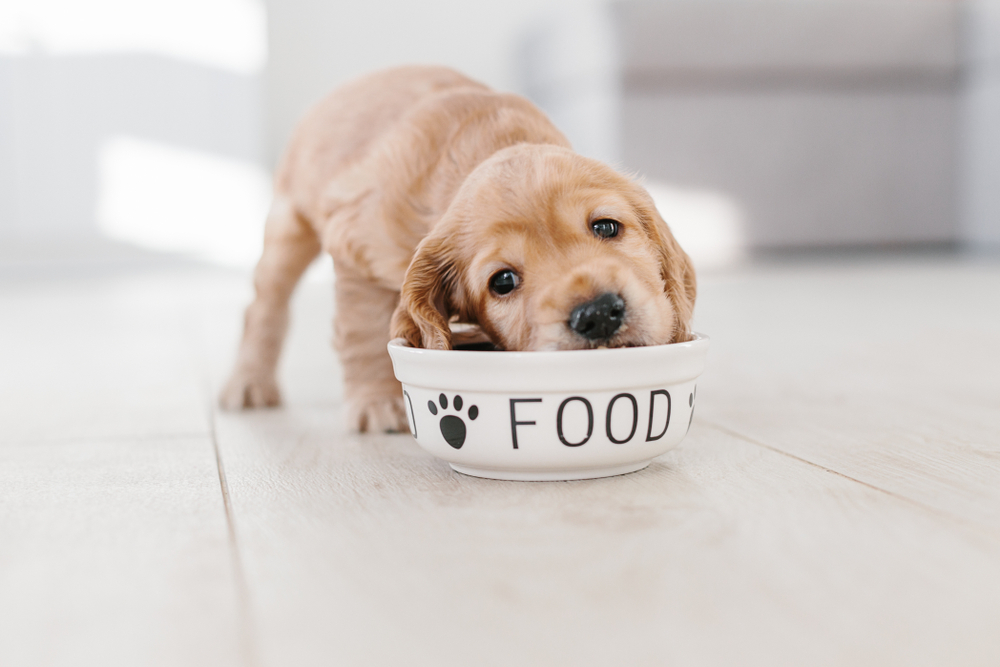How much should I feed my dog?
Many of us consider dogs to be members of our family, and as pet parents, we want to ensure that our furry friends are well taken care of in every way. One essential aspect of a dog’s health is its diet.

A balanced diet
The right balance of nutrients and portion sizes can make a significant difference in your dog’s energy levels, weight management, and overall well-being. In this comprehensive guide, we will discuss key factors that influence your dog’s dietary needs, provide detailed feeding guidelines for puppies, adult dogs, and senior dogs, and focus on essential nutrients that must be included in your dog’s diet. Whether you have a new puppy or an ageing dog, this guide will help you make informed choices about your dog’s nutrition.
1. Key Factors Influencing Your Dog’s Dietary Needs:
First and foremost, your dog’s breed, size, and age play a significant role in determining its nutritional needs. Larger breeds require a different diet than smaller breeds, while puppies, adult dogs, and senior dogs have different dietary needs. Other factors that affect your dog’s diet include its activity level, underlying health conditions, and body weight. Dog owners must also consider their dog’s digestive system and food allergies.
2. Detailed Feeding Guidelines:
Let’s go into further detail about feeding guidelines for your furry friend.
– Puppies: Puppies require considerable portions of food rich in protein and calorie-dense to support their growth. A general rule of thumb is to feed puppies three to four meals per day. The number of calories required will depend on its age, breed, size, and activity level. Consult with your veterinarian about your specific puppy’s needs.
– Adult Dogs: Adult dogs have varied needs, depending on their size, breed, and activity level. A small breed may need as little as 300-400 calories per day, while a large breed may require 1600-1800 calories. Keep in mind that overfeeding can lead to obesity and other health complications, while underfeeding can lead to malnourishment and weight loss.
– Senior Dogs: Senior dogs often require fewer calories but still need a nutrient-rich diet. The diet should focus on lean protein sources, healthy fats, and a high-fiber diet. A senior dog’s diet should not be too high in fat or calories, as obesity can lead to health complications.
3. Focus on Nutrients:
Dogs require specific nutrients to thrive, including proteins, carbohydrates, fats, vitamins, and minerals. Proteins are essential for muscle growth, repair, and maintenance. Carbohydrates provide the energy needed for daily activities. Fats provide important benefits such as keeping your dog’s skin and coat healthy. Vitamins and minerals aid in bone health, cellular function, and immune function overall. When choosing food for your furry friend, ensure the food contains all the essential nutrients. Meat-based diets are typically the best source of protein for dogs.
4. Popular Breeds in the UK:
Lastly, we’d like to share a few insights into some of the most popular breeds in the UK and their nutritional needs. For example, Golden Retrievers require a high-calorie diet suitable for their size and energy level, while West Highland Terriers require a diet rich in protein for healthy coat maintenance.
What else do I need to know
1. Treats
Doggie’s tummies and treats. But before we start treating our beloved furry friends, let’s think about what we’re actually feeding them. As much as a couple of biscuits might seem like a harmless snack to us, to a pup, it’s a lot more. And let’s not forget that too many treats can lead to an overweight pet. So, what’s a pet owner to do? Well, remember that there are plenty of other ways to reward your four-legged pal – like walkies, playtime, or a good grooming session. And if you do decide to indulge them with a tasty treat, make sure to factor it into their daily food allowance. I keep back some morning breakfast kibble and give it to Oscar throughout the day. After all, we love our dogs, and we want what’s best for them – even if that means showing our love in ways other than treats. Treats should make up no more than 10% of your dog’s total caloric intake each day.
2. Table Scraps:
Who doesn’t love giving their furry friend a little treat every now and then? It’s totally OK to give your dog table scraps, just make sure they’re healthy and won’t lead to any bad habits. Consider saving those scraps for later so your pup doesn’t expect a snack every time you sit down for dinner. And when it comes to choosing snacks, opt for something nutritious and low in calories, salt, and fat. After all, we want our fur babies around for as long as possible, right? Remember, treats should make up no more than 10% of your dog’s total caloric intake each day. So treat your pup with love, but also responsibility!
Whether you’re looking for something savory or sweet, there are plenty of snack options to choose from.
Lean bits of cooked turkey, beef, pork, or fish without the skin and without bones make a great savoury option.
Raw vegetables like carrots, celery, lettuce, and cabbage hearts provide a healthy crunch.
Cooked vegetables without butter and salt are a great bet, as is plain raw pumpkin.
Peanut butter is a delicious treat, it’s important to remember that it’s also very oily and high in calories, so it’s best to enjoy it sparingly.
So next time you’re feeling snacky, try reaching for one of these tasty options instead.
3. Changes to diet
Sometimes we are required to change our dogs diet for health reasons, or simply because we want to try something new. But before you go swapping out their kibble for something else, it’s important to make the change gradually. You wouldn’t want to upset their stomach with an abrupt switcharoo. Just like us humans, dogs need a little adjustment time when it comes to adjusting what they’re eating. So, take it slow, and introduce the new food gradually while phasing out the old. Your pup will thank you for taking the time to make sure their tummy stays happy and healthy.
4. Turning Veggie:
Vegetarian and vegan lifestyles are becoming more popular for humans, but what about our furry friends? It turns out that dogs can thrive on a veggie diet just as well as a meat-based one. The key is to make sure you’re buying a complete commercial food that meets your dog’s age and lifestyle needs. While homemade diets are sometimes tempting, they can be hard to balance and ensure your dog is getting all the nutrients they need. As with any feeding, always consult with a veterinarian or vet nurse to ensure your furry friend is getting everything they need. So if you’re a veggie yourself, don’t worry – your pup can join in on the lifestyle too!
5. Free Feeding:
When it comes to feeding your dog, it’s important to know what’s best for their health. While free feeding may seem like an easy option for busy owners, it’s actually a big no no for most dogs. Unless your dog is extremely active or has trouble maintaining a healthy weight, it’s best to stick to a regular feeding schedule. Leaving food out all day can lead to overeating and obesity, especially in puppies who are still developing. Plus, there’s a risk of the food going off if it’s left out too long, which can lead to upset tummies and other issues. So, for the health and happiness of your furry friend, it’s best to avoid free feeding whenever possible.
In conclusion, the nutritional needs of your furry friend are diverse and depend on various factors, including breed, size, age, and activity levels. While feeding your dog may seem like a simple task, it requires a thorough understanding of their nutritional needs and careful consideration when choosing different food types. With this comprehensive guide, we hope that you now have a clear understanding of the nutritional needs of your dog, and you can make informed choices that can keep your furry friend happy, healthy, and full of energy. Consult with your veterinarian if you have any doubts or questions about your dog’s diet and nutritional needs. With the right diet, your dog can live a healthy and happy life.
Happy Hound, Happy Humans

